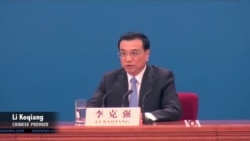This week, Japan and China will hold their first security talks in more than four years. Then, the foreign ministers of South Korea, China and Japan will meet for the first time in nearly three years. The United States is also working behind the scenes to help these Asian powers resolve their historical and nationalistic grievances and come together to deal with the growing nuclear threat from North Korea.
Japanese Prime Minister Shinzo Abe’s visit to a war memorial last year that included the names of war criminals from World War II angered many in China and South Korea whose families suffered under Japan’s brutal occupation.
While the war ended 70 years ago, the unresolved grievances over past atrocities won’t go away, especially the issue of comfort women, the over 200,000 women in Asia who were forced to work as sex slaves for Japanese soldiers during the war.
In Seoul, young people hold weekly rallies in front of the Japanese Embassy to call on Tokyo to apologize and make amends.
Old grievances remain
In Beijing, Premier Li Keqiang of China says Tokyo must atone for past wartime atrocities before relations with Japan can improve.
“One needs to hold a right outlook toward history and that means that one needs to take history as a mirror and at the same time look to the future,” said Li.
These historical grievances, as well as disputes over small islands, have already provoked skirmishes and impeded trade and investment between Japan and its neighbors.
Daniel Pinkston, a Northeast Asia analyst with the International Crisis Group, says true reconciliation requires recognition that all sides, including Japan, suffered during the war. But that is unlikely to happen in this politicized environment.
“I don’t see any of this in East Asia. It’s like it is a competition to disparage the other side and who is more guilty and we suffered but you didn’t,” he said.
U.S. Undersecretary of State Wendy Sherman was recently criticized by officials in Seoul for supposedly taking Japan’s side when she suggested these issues were being exploited by all sides to garner political support.
Facing North Korea threat
Hosaka Yuji, a political science professor at Sejong University, says the United States is quietly urging all sides to end their differences to deal with the greater threat, stopping North Korea’s pursuit of nuclear weapons.
“The United States hinted through Sherman that Korea, China and Japan should not fight but make concessions to each other on historical issues while all need to resolve the issues focusing on North Korea,” said Hosaka Yuji.
Also complicating relations are regional concerns over China’s increasing military might and Prime Minister Abe’s re-interpretation of the country’s pacifist constitution to empower Japan’s military.






